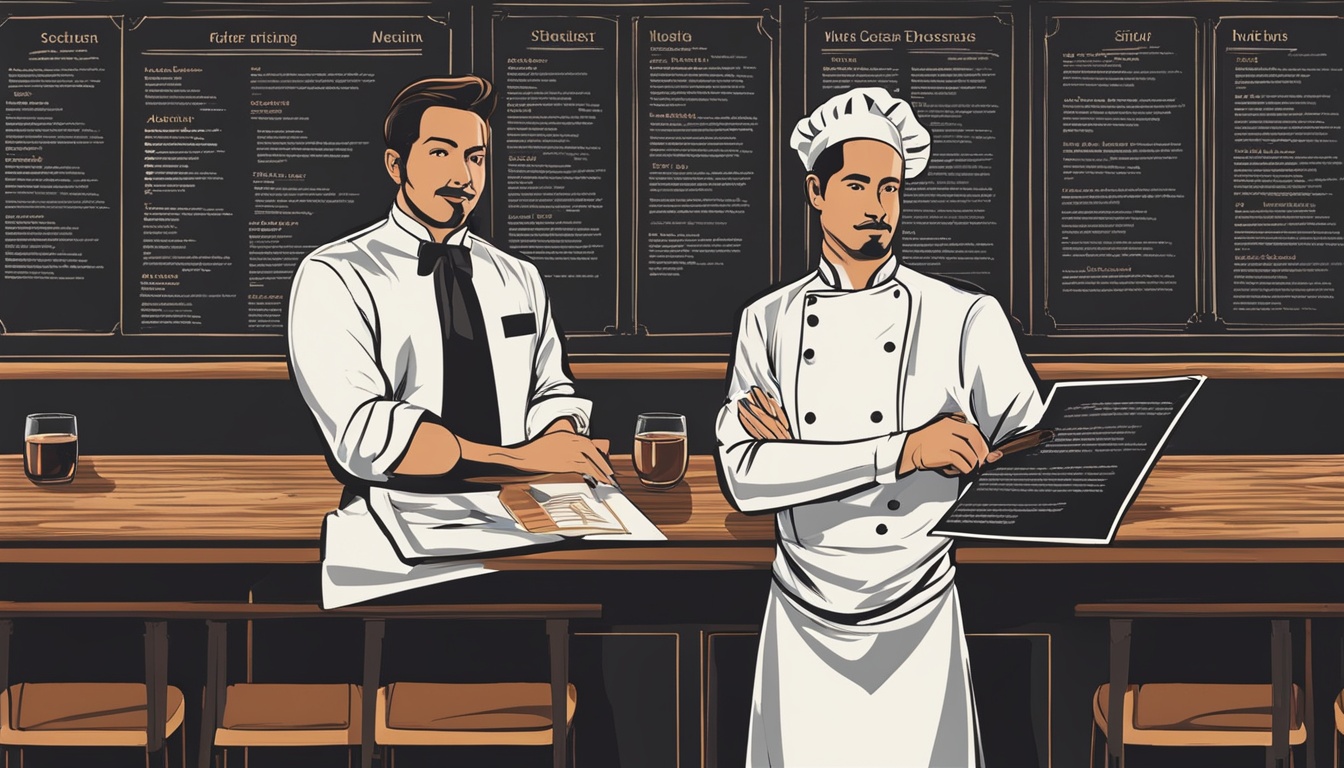Did you know that 60% of restaurants fail within the first year, and 80% shut down before their fifth anniversary? Despite these daunting statistics, the restaurant industry continues to grow, with more than 1 million restaurant locations in the United States alone. This presents a significant opportunity for experienced professionals to start a restaurant consulting business and help these establishments succeed.
As a restaurant consultant, you can offer valuable expertise in areas such as menu development, kitchen design, staff training, and marketing strategies. By helping restaurants optimize their operations and increase profitability, you can build a rewarding career while making a positive impact on the industry. To get started, you’ll need to:
- Get a hospitality education in management, culinary arts, or a related field to gain technical, bureaucratic, and business knowledge related to the industry
- Gain hands-on experience working in a range of restaurants and positions to understand the business from different perspectives and levels
- Build a strong network of industry contacts, including city council, health and fire departments, and food industry professionals to expedite procedures and expand your business
Key Takeaways
- Restaurant consulting is a growing industry with significant opportunities for experienced professionals
- A hospitality education and hands-on experience are essential for starting a successful restaurant consulting business
- Building a strong network of industry contacts can help expedite procedures and expand your business
- Restaurant consultants offer expertise in menu development, kitchen design, staff training, and marketing strategies
- Helping restaurants optimize their operations and increase profitability can lead to a rewarding career in the food service industry
Develop Your Expertise in the Restaurant Industry
To become a successful restaurant consultant, it’s essential to develop a deep understanding of the industry and hone your skills in various areas. Over 40,000+ readers have engaged with publications providing guidance on how to start a restaurant consulting business, highlighting the importance of gaining hands-on experience and pursuing relevant education.
Gain Hands-On Experience in Various Restaurant Roles
One of the best ways to develop your expertise in the restaurant industry is by working in various roles, such as chef, manager, server, and bartender. This hands-on experience will give you a comprehensive understanding of restaurant operations, including menu engineering, kitchen processes, and workflow bottlenecks. By experiencing the challenges and opportunities firsthand, you’ll be better equipped to provide valuable insights and solutions to your future clients.
Some key areas to focus on during your hands-on experience include:
- Financial management: Understanding how restaurants manage their finances effectively
- Menu development: Balancing customer preferences, food costs, and culinary innovation
- Operational efficiency: Optimizing kitchen processes and identifying workflow bottlenecks
- Staff training and development: Maintaining a skilled and motivated workforce
- Marketing and branding: Attracting and retaining customers through effective strategies
Pursue Relevant Education and Certifications
In addition to hands-on experience, pursuing relevant education and certifications can demonstrate your expertise and credibility as a restaurant consultant. Consider obtaining certifications in food safety, hospitality management, and culinary arts to showcase your knowledge and commitment to the industry.
Attending workshops, conferences, and training programs is another excellent way to stay current with industry trends and best practices. These events provide opportunities to learn from experienced professionals, network with potential clients, and gain insights into the latest challenges and solutions in the restaurant industry. By continuously expanding your knowledge and skills through education and training, you’ll be better prepared to offer valuable restaurant management training and conduct comprehensive restaurant feasibility studies for your clients.
Define Your Niche and Target Market
To succeed as a restaurant consultant, it’s crucial to identify your niche and target market. Begin by assessing your strengths and areas of expertise, such as restaurant marketing strategies, menu design, operations optimization, or food cost analysis. By focusing on your specialties, you can differentiate yourself from competitors and attract clients who seek your specific skill set.
Next, research your target market thoroughly. Consider the types of restaurants you want to work with, such as fast-casual, fine dining, or food trucks. Determine the cuisines and geographic locations you’d like to focus on, as this will help you tailor your services and marketing efforts to reach your ideal clients effectively.
Develop a clear understanding of your target clients’ needs, challenges, and goals. For example, some restaurants may struggle with high food costs, while others may need assistance with marketing or staff training. By identifying these pain points, you can create targeted solutions that address their specific requirements and demonstrate the value you bring to their business.
When defining your niche, strike a balance between specificity and market size. While narrowing down your focus can make your marketing more effective, ensure that your target audience is large enough to sustain your consulting business. For instance, specializing in social media marketing for independent coffee shops in a particular city may be too narrow, whereas focusing on marketing strategies for fast-casual restaurants in a larger region could be more viable.
Remember, selecting a niche and target market that align with your expertise and passion can lead to more efficient marketing, higher-quality service delivery, and greater job satisfaction. By clearly defining your ideal client and the unique value you offer, you’ll be well-positioned to launch and grow a successful restaurant consulting business.
Create a Comprehensive Business Plan
When starting your restaurant consulting business, it’s essential to develop a comprehensive business plan that outlines your goals, strategies, and financial projections. A well-crafted business plan serves as a roadmap for your company’s growth and helps you stay focused on your objectives.
Outline Your Services and Pricing Structure
Begin by clearly defining the restaurant business plan and food service consulting services you will offer to your clients. This may include:
- Menu development and optimization
- Kitchen design and layout
- Staff training and development
- Marketing strategies and branding
- Financial analysis and cost control
Next, establish a pricing structure for your services that reflects your expertise, the value you provide, and market demand. Consider offering package deals or tiered pricing options to cater to different client needs and budgets.

Determine Your Business Structure and Register Your Company
Decide on the most appropriate business structure for your restaurant consulting firm, such as a sole proprietorship, partnership, or limited liability company (LLC). Each structure has its own advantages and disadvantages, so consult with a legal professional or accountant to determine the best option for your specific situation.
Once you’ve chosen your business structure, register your company with the appropriate state and local agencies. This typically involves filing articles of incorporation or organization, obtaining an Employer Identification Number (EIN) from the IRS, and registering with your state’s department of revenue.
Secure Necessary Licenses and Permits
To operate legally, your restaurant consulting business will need to obtain various licenses and permits. These may include:
- Business license
- Professional liability insurance
- Health department permits (if handling food)
- Zoning permits (if operating from a physical office)
Research the specific requirements for your location and industry, and ensure that you have all the necessary documentation before launching your business. Staying compliant with regulations will help protect your company and demonstrate your professionalism to potential clients.
Establish Your Brand Identity
Creating a strong brand identity is crucial for your restaurant consulting business to stand out in the competitive hospitality consulting industry. Your brand should reflect your unique expertise, values, and personality, and effectively communicate the value you offer to potential clients.
Develop a Professional Website
Your website is often the first point of contact for potential clients, so it’s essential to create a professional, user-friendly site that showcases your restaurant consulting services, expertise, and portfolio. Your website should include:
- A clear description of your services and how you can help restaurant owners and managers succeed
- Testimonials and case studies highlighting your successful projects and satisfied clients
- An “About” page that introduces you and your team, and establishes your credibility in the hospitality consulting industry
- A blog featuring informative articles, tips, and resources related to restaurant management and operations
- Contact information and a simple form for potential clients to reach out to you
Design a Memorable Logo and Business Cards
A well-designed logo and business cards are essential elements of your brand identity. Your logo should be simple, memorable, and reflective of your restaurant consulting brand’s personality and values. Consider working with a professional graphic designer to create a logo that effectively represents your business and sets you apart from competitors.
Your business cards should include your logo, name, title, contact information, and website URL. Choose a high-quality card stock and a design that aligns with your brand identity. Always carry a supply of business cards with you to networking events, conferences, and meetings with potential clients in the hospitality consulting industry.
Ensure that your brand identity, including your logo, color scheme, and messaging, is consistent across all your marketing materials, such as your website, business cards, brochures, and social media profiles. This consistency helps build brand recognition and trust among your target audience in the restaurant consulting industry.
Build a Strong Network within the Restaurant Industry
As a hospitality consulting professional, building a strong network within the restaurant industry is crucial for the success and growth of your business. Networking allows you to connect with restaurant owners, chefs, and other industry professionals, opening doors to new opportunities and collaborations. By actively engaging in the restaurant community, you can establish yourself as a trusted and knowledgeable resource, ultimately attracting more clients to your consulting business.
One of the most effective ways to expand your network is by attending industry events and conferences. These gatherings provide an excellent platform to meet and interact with like-minded individuals who share your passion for the restaurant industry. Take advantage of these opportunities to introduce yourself, exchange business cards, and engage in meaningful conversations about the challenges and trends facing the industry. By demonstrating your expertise and genuine interest in helping others succeed, you can forge lasting relationships that may lead to future partnerships or client referrals.
In addition to attending events, consider joining professional organizations such as the National Restaurant Association or the International Foodservice Consultants Society. These organizations offer valuable resources, including educational programs, industry reports, and networking opportunities. As a member, you can access exclusive events, webinars, and forums where you can connect with other restaurant professionals and stay up-to-date with the latest trends and best practices in the industry. Moreover, being a part of these organizations lends credibility to your consulting business, as it demonstrates your commitment to professional development and industry engagement.
Another effective strategy for building your network is to collaborate with complementary businesses that serve the restaurant industry. These may include:
- Equipment suppliers
- Interior designers
- Marketing agencies
- Technology providers
- Food and beverage distributors
By partnering with these businesses, you can offer comprehensive solutions to your clients, addressing their various needs and challenges. For example, if a restaurant owner seeks your advice on improving their kitchen layout, you can recommend a trusted equipment supplier or interior designer from your network. These collaborations not only enhance the value you provide to your clients but also help you expand your reach and attract new business opportunities through referrals and joint projects.
Remember, building a strong network within the restaurant industry is an ongoing process that requires time, effort, and genuine engagement. By consistently attending events, joining professional organizations, and collaborating with complementary businesses, you can establish yourself as a respected and well-connected hospitality consulting professional, ultimately driving the growth and success of your business.
Develop a Marketing Strategy to Attract Clients
To successfully grow your restaurant consulting business, it’s crucial to develop a comprehensive marketing strategy that showcases your expertise and attracts potential clients. By leveraging various marketing channels and tactics, you can effectively reach your target audience and demonstrate the value you bring to their businesses. Here are some key elements to include in your marketing strategy:
Leverage Social Media Platforms
Social media platforms like LinkedIn, Instagram, and Facebook provide excellent opportunities to showcase your expertise and connect with potential clients in the restaurant industry. Create engaging profiles that highlight your skills, experience, and unique value proposition. Share valuable content, such as industry insights, tips, and case studies, to demonstrate your knowledge and build trust with your audience. Engage with other professionals in the industry by commenting on their posts, joining relevant groups, and participating in discussions to expand your network and increase your visibility.

Attend Industry Events and Conferences
Attending industry events and conferences is an effective way to network with restaurant professionals, learn about the latest trends, and promote your services. Look for opportunities to speak at these events or host workshops to establish yourself as a thought leader in the industry. Be prepared with business cards, brochures, and a compelling elevator pitch to introduce yourself and your services to potential clients. Follow up with the contacts you make after the event to nurture those relationships and explore potential collaborations or partnerships.
Utilize Content Marketing to Showcase Your Expertise
Content marketing is a powerful strategy to attract organic traffic to your website and demonstrate your expertise in the restaurant industry. Develop a content calendar that includes blog posts, videos, whitepapers, and other valuable resources that address the challenges and goals of your target audience. Share your content on your website, social media channels, and relevant industry platforms to expand your reach and establish yourself as a go-to resource for restaurant owners and operators. By consistently providing valuable insights and actionable advice, you can build trust with your audience and position yourself as a trusted advisor in the food service consulting space.
Create a Portfolio of Your Work and Accomplishments
As a restaurant consultant, it’s essential to create a compelling portfolio that showcases your expertise, achievements, and the value you provide to clients. By documenting your work through photos, case studies, and testimonials, you can demonstrate your ability to overcome specific challenges and deliver measurable results in areas such as profitability, customer satisfaction, and streamlined operations.
When building your portfolio, consider including examples of successful menu engineering projects, where you’ve optimized a restaurant’s menu to increase sales and profitability. Highlight how your strategic placement of high-profit items and removal of underperforming dishes led to improved financial performance.
In addition to menu engineering, showcase your accomplishments in other areas of restaurant consulting, such as:
- Implementing effective marketing strategies to attract new customers and increase loyalty
- Redesigning kitchen layouts to improve efficiency and reduce wait times
- Developing comprehensive staff training programs to enhance service quality and customer satisfaction
- Conducting financial analyses to identify cost-saving opportunities and boost profitability
To keep your portfolio current and relevant, regularly update it with your latest projects and accomplishments. This demonstrates your ongoing commitment to delivering exceptional results and staying at the forefront of the restaurant industry.
By creating a strong portfolio that highlights your skills, experience, and achievements in restaurant consulting and menu engineering, you’ll be well-positioned to attract new clients and grow your business.
Offer Exceptional Customer Service to Build Client Loyalty
As a restaurant consultant, your success relies heavily on your ability to provide exceptional customer service and build lasting relationships with your clients. By prioritizing open communication, delivering measurable results, and going above and beyond to meet your clients’ needs, you can establish a loyal client base that will help your business thrive.
Prioritize Open Communication and Transparency
One of the keys to building trust and loyalty with your clients is maintaining open and transparent communication throughout the consulting process. This involves:
- Providing regular updates on project progress and any challenges or obstacles you encounter
- Being responsive to client inquiries and concerns, addressing them promptly and professionally
- Clearly explaining your strategies, recommendations, and the reasoning behind them
- Seeking feedback from your clients and incorporating their input into your work
By fostering an environment of open communication and transparency, you demonstrate your commitment to your clients’ success and help build a strong foundation for long-term partnerships.
Deliver Measurable Results and Value to Your Clients
To retain clients and attract new ones, it’s crucial to deliver tangible results and value through your restaurant consulting services. This involves:
- Setting clear, measurable goals and objectives for each project, aligned with your clients’ needs and priorities
- Utilizing data-driven insights and metrics to track progress and demonstrate the impact of your work
- Providing detailed reports and analyses that showcase the improvements and cost savings achieved through your consulting efforts
- Offering ongoing support and guidance to help your clients maintain and build upon the success you’ve helped them achieve
By consistently delivering measurable results and value, you can differentiate yourself from competitors and establish a reputation as a trusted and effective restaurant consultant. This, in turn, can lead to increased client loyalty, referrals, and long-term success for your business.
Stay Current with Industry Trends and Best Practices
To excel as a restaurant consultant, it’s crucial to stay up-to-date with the latest trends, innovations, and best practices in the hospitality industry. By continuously expanding your knowledge and adapting to the evolving landscape of restaurant operations, you can provide your clients with the most relevant and valuable insights to help them succeed.
One effective way to stay informed is by regularly reading industry publications, such as:
- Restaurant Business
- Nation’s Restaurant News
- QSR Magazine
These resources offer a wealth of information on current trends, case studies, and expert opinions that can help you refine your restaurant consulting strategies and better serve your clients.
In addition to reading, attending webinars, workshops, and conferences is an excellent way to learn from industry experts, network with other professionals, and gain new insights and skills. These events provide opportunities to dive deeper into specific topics, ask questions, and engage in meaningful discussions that can help you grow as a consultant.
Another crucial aspect of staying current is continuously seeking feedback from your clients. By actively listening to their needs, challenges, and preferences, you can adapt your services to better meet their expectations and provide more targeted solutions. This approach not only helps you stay relevant but also demonstrates your commitment to your clients’ success, fostering long-term relationships built on trust and value.
By dedicating yourself to ongoing learning and growth, you can position yourself as a knowledgeable and adaptable restaurant consultant who is always at the forefront of the industry. This commitment to excellence will set you apart from competitors and help you attract and retain clients who appreciate your expertise and dedication to their success.
How to Start a Restaurant Consulting Business: A Step-by-Step Guide
Starting a restaurant consulting business requires a combination of industry expertise, business acumen, and a passion for helping others succeed. By following these essential steps, you can lay the foundation for a thriving consulting practice that delivers value to your clients and establishes you as a trusted expert in the field.
Assess Your Skills and Experience
Before diving into the world of restaurant consulting, take a critical look at your own strengths and weaknesses. Evaluate your areas of expertise within the restaurant industry, such as menu development, kitchen design, or financial management. Identify any gaps in your knowledge or skills that you may need to address through additional training or education. Determine what unique qualities and experiences you bring to the table that set you apart from other consultants in the market. This self-assessment will help you focus your services and target the right clients.
Research the Market and Competition
Conduct thorough market research to understand the demand for restaurant consulting services in your target area. Analyze the types of restaurants, cuisines, and challenges that are prevalent in your market. Identify potential competitors and assess their strengths and weaknesses. Look for opportunities to differentiate yourself by offering specialized services or focusing on underserved niches. Use this research to refine your business plan and develop a compelling value proposition that resonates with potential clients.
Set Up Your Business Operations
With a clear understanding of your skills and market opportunities, it’s time to set up your business operations. Choose a business structure that aligns with your goals and protects your personal assets, such as a limited liability company (LLC) or sole proprietorship. Register your business with the appropriate state and local agencies, and obtain any necessary licenses and permits. Develop a pricing structure for your services that reflects your expertise and the value you provide to clients. Create a professional website and marketing materials that showcase your skills and experience, highlighting relevant keywords such as how to start a restaurant consulting business and restaurant feasibility studies.
Launch Your Marketing Efforts
To attract clients and grow your business, implement a multifaceted marketing strategy. Leverage your existing network of industry contacts to spread the word about your consulting services. Attend industry events and conferences to expand your network and showcase your expertise. Develop a strong online presence through social media platforms like LinkedIn and Instagram, sharing valuable content and engaging with potential clients. Utilize content marketing techniques, such as blogging and creating informative videos, to demonstrate your knowledge and establish yourself as a thought leader in the restaurant consulting space. By consistently promoting your services and delivering exceptional results, you can build a loyal client base and grow your consulting business over time.
FAQ
What qualifications do I need to become a restaurant consultant?
How do I identify my niche and target market as a restaurant consultant?
What services should I offer as a restaurant consultant?
How important is networking in the restaurant consulting business?
What marketing strategies should I use to attract clients as a restaurant consultant?
How can I demonstrate the value I provide to my clients as a restaurant consultant?
Author
-

Lucas Martinez is an accomplished entrepreneur with a passion for startups. He has launched and scaled multiple businesses, providing pragmatic advice on starting and growing a business.
View all posts



